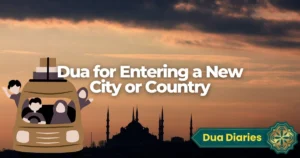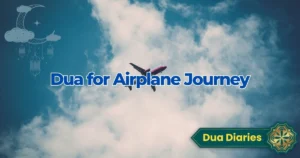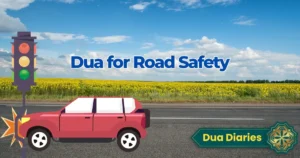
Safar Ki Dua in Quran: Origin, Context, and Complete Explanation
رہنمائی فہرست Guidance Index
When you look for Safar ki dua in Quran, you’ll find its beautiful origin in Surah Az-Zukhruf, verses 13-14. Let’s explore how this powerful travel prayer comes directly from Allah’s words in the Quran.
The Quranic Source of Safar ki Dua
Allah says in the Quran:
سُبْحَانَ الَّذِي سَخَّرَ لَنَا هَذَا وَمَا كُنَّا لَهُ مُقْرِنِينَ وَإِنَّا إِلَى رَبِّنَا لَمُنْقَلِبُونَ
“Glory to Him Who has given us control over this, and we wouldn’t have been able to control it [ourselves]. And surely, to our Lord, we will return.”
(Surah Az-Zukhruf, 43:13-14)


Understanding the Quranic Context
These verses appear in Surah Az-Zukhruf when Allah talks about His blessings of transport. The context shows how Allah:
- Reminds us about His power over all transportation
- Shows us His mercy in making transport possible
- Teaches us to thank Him for these blessings
- Reminds us about our return to Him
Word-by-Word Analysis from the Quran
Let’s break down each word:
سُبْحَانَ (Subhana) – Glory be
- Root word means perfection and purity.
- Used in Quran 41 times.
- Shows total praise for Allah.
الَّذِي (Allazi) – The One Who
- Points directly to Allah.
- Shows His direct involvement.
- Connects us to His power.
سَخَّرَ (Sakhkhara) – Subjected/Made serviceable
- Appears in Quran regarding Allah’s control over creation.
- Shows complete mastery.
- Indicates Allah’s gift to humanity.
لَنَا (Lana) – For us
- Shows Allah’s special favor to humans.
- Indicates His direct blessing.
- Reminds us of His care.
هَذَا (Haza) – This
- Refers to the means of transport.
- Can apply to any vehicle.
- Shows immediacy of blessing.
Quranic Themes in Safar ki Dua
The dua connects to several Quranic themes:
Gratitude (Shukr)
- Recognizing Allah’s blessings.
- Thanking Him for transport.
- Acknowledging His power.
Human Weakness
- Accepting our limitations.
- Understanding our dependence.
- Recognizing Allah’s strength.
Return to Allah
- Reminder of afterlife.
- Journey as a metaphor.
- Life’s temporary nature.
Similar Verses in the Quran
The Quran mentions travel in many places:
- Surah An-Nahl (16:8)
“And [He created] horses, mules, and donkeys for you to ride…” - Surah Ya-Sin (36:42)
“And We created for them similar vessels on which they ride.” - Surah Al-Mulk (67:15)
“He is the One Who made the earth subservient to you…”
Prophetic Understanding of the Quranic Dua
The Prophet Muhammad (peace be upon him) taught us to:
- Read this dua regularly during travel.
- Understand its deep meaning.
- Connect it to daily life.
- Share it with others.
Practical Lessons from the Quranic Dua
The Quran teaches us through this dua:
Humility
- We can’t control everything.
- We need Allah’s help.
- We must stay humble.
Gratitude
- Thank Allah for safe travel.
- Appreciate modern transport.
- Remember His blessings.
Awareness
- Every journey has a purpose.
- We’re always returning to Allah.
- Life itself is a journey.
Connecting Quran to Daily Travel
Apply this Quranic dua by:
- Understanding its meaning.
- Feeling its message.
- Reading it mindfully.
- Teaching others.
- Making it a habit.
Modern Applications of the Quranic Dua
This Quranic prayer applies to:
- All types of transport.
- Short and long journeys.
- Daily commutes.
- Family travels.
- Business trips.
The Dua’s Impact on Travelers
Reading this Quranic dua:
- Increases safety awareness.
- Builds Allah’s connection.
- Brings peace of mind.
- Creates blessed journeys.
- Protects travelers.
Teaching Children the Quranic Connection
Help kids understand:
- The dua’s Quranic source.
- Its simple meaning.
- When to read it.
- Why it’s important.
- How to remember it.
Common Questions About the Quranic Origin
Is this dua only in Surah Az-Zukhruf?
Yes, this specific dua appears in verses 13-14 of Surah Az-Zukhruf.
Why is it called Safar ki dua?
Muslims use it specifically for travel, though its Quranic context is broader.
Can we add other Quranic duas?
Yes, you can combine it with other travel-related Quranic duas.
Preserving the Quranic Connection
Remember to:
- Keep the Arabic text accurate.
- Learn the correct pronunciation.
- Understand the meaning.
- Share the Quranic source.
- Practice regularly.
Making the Quranic Dua Part of Life
Build a connection by:
- Reading it daily.
- Understanding its context.
- Teaching others.
- Sharing its benefits.
- Living its message.
Conclusion
Safar ki dua’s Quranic origin shows its importance in Islam. When we understand its place in the Quran, we appreciate its deeper meaning. This isn’t just a travel prayer – it’s a divine reminder of Allah’s power and our return to Him.
Let’s make this beautiful Quranic dua part of our daily travels. Remember its origin, understand its meaning, and share its blessings with others.
May Allah accept our duas and protect all travelers.
Note: For accuracy in Quranic references, always verify with authentic sources and scholars.



